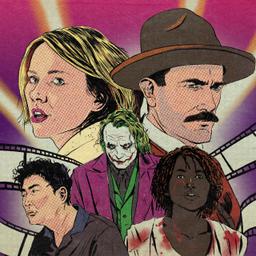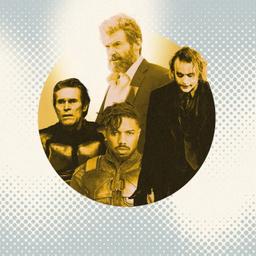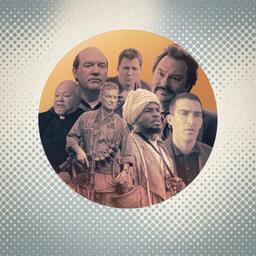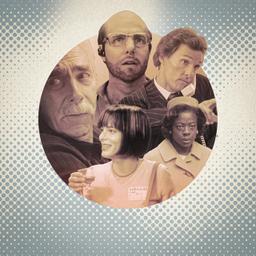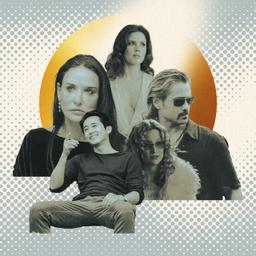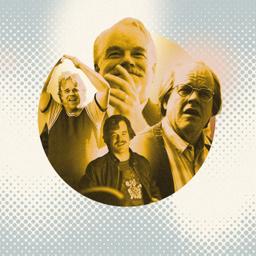There are plenty of perennial heavyweights on The Ringer’s list of this century’s best performances—the Daniel Day-Lewises, Cate Blanchetts, and Meryl Streeps of the world. Those actors are guarantees of a movie’s pedigree, and they’re going to turn in powerhouse showings and rack up Oscar noms almost every time they show up on screen. You could call them the alphas of this century’s pack of actors. But sometimes, it’s the underdogs who are a little more interesting. These are the actors and performers who aren’t at the center of conversations about our great thespians—until they finally break through in a big way, with one volcanic role. I’m not talking about fresh faces like Mikey Madison in last year’s Anora or Timothée Chalamet as he began his pursuit of greatness in Call Me by Your Name. I’m talking about actors (or the otherwise notorious, like pop stars or wrestlers or comedians) who’ve been on the scene for a while but finally have the revelatory kind of performance that rewrites the script of their career and forces them into (or back into) conversations about the greats.
Like Nicole Kidman, I watch movies to go somewhere I’ve never been before—and to see performances I never thought I would, from people I’d written off as MTV VJ has-beens or failed child stars or WWE beefcakes. So as part of The Ringer’s celebration of the great performances of the quarter century, I present a taxonomy of the actors who have changed hearts and minds over the past 25 years, precisely because we’d initially misestimated their talents. In creating this taxonomy, I considered the following criteria:
- Did this performer already have an established career in entertainment? Again, this taxonomy isn’t a celebration of breakout performances. This is a tribute to those actors who reset their careers with one big, transformative role.
- Did this performance lead to general acclaim or a new recognition of the actor’s abilities? To qualify, an actor should have gotten broad admiration for their work—as determined by Oscar nominations, critical consensus, or a general shift in the conversation about them.
But before we establish the categories of people most likely to go all in on a career reset: The chart below visualizes the types of projects the actors considered for this taxonomy chose for their redefining roles. Sure, this is kind of an unscientific exercise. (Does A Star Is Born fall under the “trauma plot” category? I say yes, because I cried, a lot.) Many of these roles might also fall into multiple categories. (The Iron Claw contains multitudes.) “Acclaimed director” is probably the softest; I included any movies whose directors already had been working to broad and general acclaim. So, for instance, I included Darren Aronofsky’s The Wrestler and The Whale in that category, but not Requiem for a Dream, which was what turned him into an acclaimed director in the first place. Still, it’s clear that teaming up with a strong director is a pretty good tactic if you find yourself in need of a career makeover.
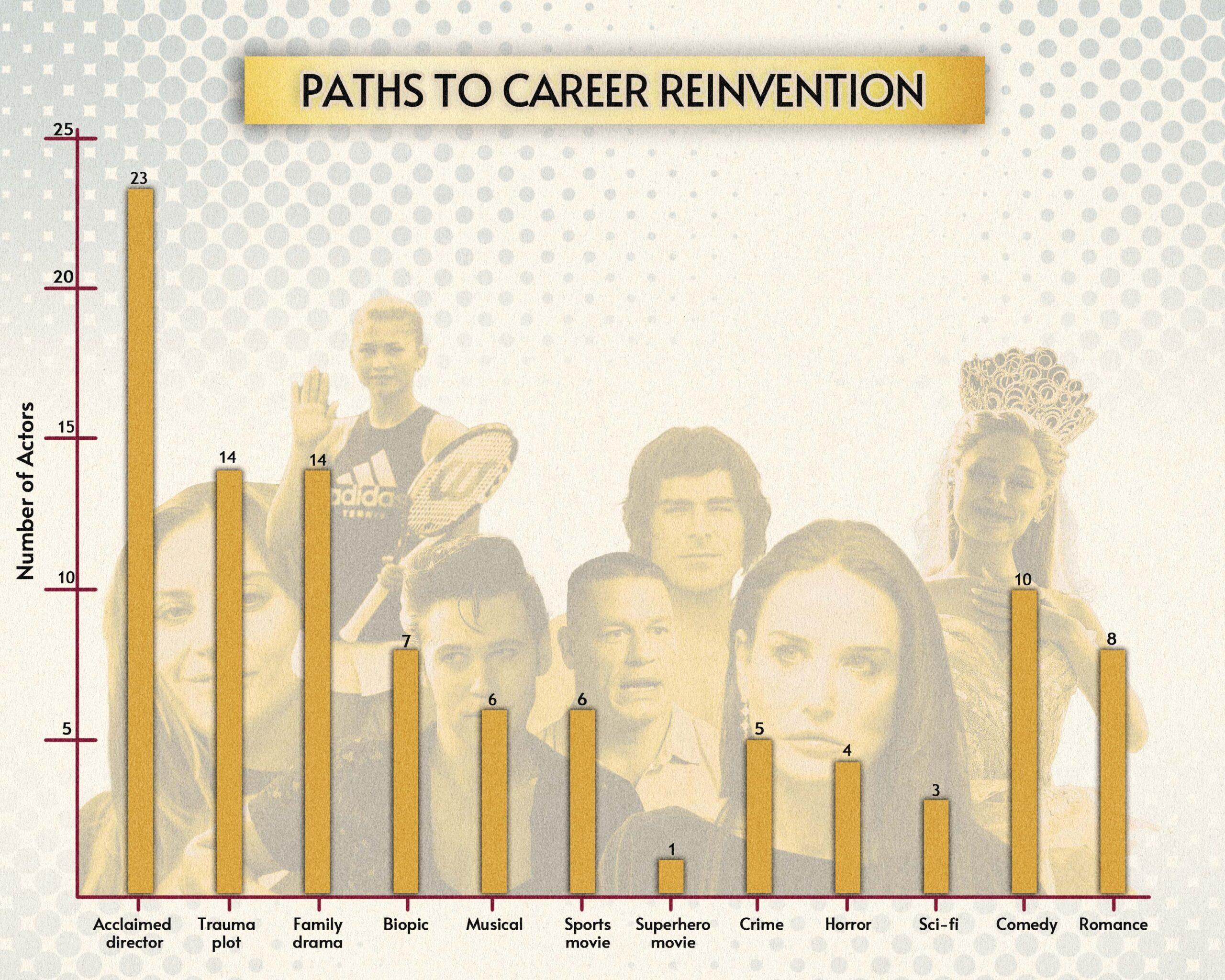
Now let’s get into the actors. Below is a taxonomy of the different kinds of performers who’ve had this sort of reinvention in the past 25 years, along with the roles that turned their careers around. For some of these, the impact of that big performance may not have lasted beyond Oscar season; others sustained the momentum to rewrite their careers entirely, emerging into the upper echelon of actors—and reminding audiences (and casting directors) to always be on the lookout for greatness in improbable places.
Teen Stars, All Grown Up
Notable examples: Anne Hathaway, Rachel Getting Married; Kristen Stewart, Clouds of Sils Maria; Shia LaBeouf, American Honey; Robert Pattinson, Good Time; Austin Butler, Elvis; Keke Palmer, Nope; Charles Melton, May December; Zac Efron, The Iron Claw; Zendaya, Challengers
The path from child stardom to adult respectability can be a rocky one (professionally and/or psychologically). The Disney and Nickelodeon school of acting, for example, favors generous portions of ham, effortful punch lines, and earnest choruses that might not translate to more grown-up roles. And many child actors never get the chance to outgrow waiting for the laugh track and vacillating between the only two emotions experienced by kids on the Disney Channel: sanitized rebellion and impish glee.
The Twilight school of acting, on the other hand, favored mumbling broodishness and intense, longing stare-offs—neither of which really required much acting talent. Although leads Kristen Stewart and Robert Pattinson had shown up in other projects before Twilight, the series reduced the actors to their quirks: Stewart was the cross-eyed girl with her mouth agape, Pattinson the pretty boy with the flared nostrils and glittering skin. Just like other actors in teen projects, they were stuck in roles that lent themselves to parody but not so much to being taken seriously.
Because “tragedy” is often equated with “prestige,” the most surefire ticket out of teen dream stardom is playing a character who’s really been through some shit. In the hands of lesser directors working with bad material, young stars can flounder in that kind of role instead of flourishing, never quite getting past their early reputations—or, maybe worse, tarnishing them with half-baked erotic thrillers or failed reboots. Many of these actors also initially tried to redefine their careers with edgy takes on grown-up material that didn’t quite work (but that did prove that they’d be willing to have sex and/or kill people on screen now; see Hathaway’s Havoc, Efron’s Extremely Wicked, Shockingly Evil and Vile, or Zendaya’s Euphoria).
But a great director (and a great script) can help guarantee that one of these “edgier” projects isn’t just trauma porn. And almost without exception, it was one of those great directors who shepherded these child stars into better roles: rising stars like Jordan Peele, the Safdie brothers, and Sean Durkin; celebrated directors like Jonathan Demme and Todd Haynes; or international auteurs like Baz Luhrmann, Olivier Assayas, Andrea Arnold, and Luca Guadagnino. They gave these former child stars the parts that let them expand beyond the one-dimensional performances of their youth: a rock ’n’ roll icon with a voice that defies and demands imitation; a wrestler left behind by his brothers, one by one; a grown-up who never got the chance to grow up; a chaos agent having one very dark night of the soul. So these young stars are to be commended, both for their good taste and for their ability to rise to the challenge set by these directors—and, of course, for resisting the temptation to just podcast about their childhoods for the rest of their lives.
Stars we’d like to see make the leap: Mary-Kate and Ashley Olsen, Lindsay Lohan, Macaulay Culkin, Hilary Duff, Joey King, Mischa Barton, Madelyn Cline, Dove Cameron, KJ Apa
The Washed and Found
Notable examples: Robert Downey Jr., Iron Man; Mickey Rourke, The Wrestler; Stephen Dorff, Somewhere; Matthew McConaughey, Dallas Buyers Club; Nicolas Cage, Mandy; Brendan Fraser, The Whale; Ke Huy Quan, Everything Everywhere All at Once; Josh Hartnett, Oppenheimer; Demi Moore, The Substance; Hugh Grant, Heretic; Pamela Anderson, The Last Showgirl
The appeal of these stars lies partly in the baked-in redemption arc: watching someone we used to love struggle in thankless roles, languish in the tabloids, end up as a punch line, and then find that dream role that brings them back from the brink of irrelevance. All these washed stars came out of a dormant period—not working at all, taking on roles in unsung VOD projects, or marking time in by-the-numbers rom-coms—to emerge triumphant, once again, in their big comebacks.
The characters in these movies often echo the actors’ redemption story: They’re has-been wrestlers, chefs, aerobics influencers, Las Vegas showgirls, English professors, and, naturally, Hollywood actors who are trying to figure out how they ever got so low. As formulaic as these stories may be—there’s almost always an estranged daughter in the mix—we can’t help but cheer on our familiar favorites (maybe because they look a little less familiar now, and we’re reminded that age comes even for the rich and famous). And there’s no better feeling than when the washed and found walk up the steps to get their nigh-inevitable Oscar and give that teary-eyed, triumphant speech they’ve been drafting their whole lives (or, alternatively, there’s no greater bitterness than when they’re snubbed in favor of the hot young stars they used to be).
Not every Hollywood comeback comes in the form of art-mirrors-life Oscar movies, though. Sometimes a change of scenery is the right setting for a career revival—especially when these actors have been lingering somewhere on the fringes, still going through the motions in diminished versions of their old roles. And sometimes their return in a new-to-them genre can be so electric that it ignites a whole industry, as Robert Downey Jr. proved with Iron Man. His turn as Tony Stark—so essential to the MCU that Marvel couldn’t bear to part with the actor for long—kick-started his fallow career and the superhero-industrial complex as a whole (although, sadly, even his charm couldn’t endure through the MCU’s entire run). Heretic leveraged Hugh Grant’s famous bumbling charms in a different direction, to seduce young Mormon missionaries to his ideas rather than Julia Roberts or Andie MacDowell into his bed—and along with supporting turns in Paddington 2 and Dungeons & Dragons, it flipped his persona on its head, from sincere loverboy to dastardly, delightful villain.
And then there’s another route, often conjoined (like a twin growing out of your back) with one or both of the above: to transform yourself completely, almost as if you’re acknowledging the fact that your own body has changed, too. (Or maybe just because total transformation is one of the most successful Oscar ploys there is.) Make yourself ugly, fat, or scarily thin for a role, and you’ll draw in a fascinated—maybe even leering—attention that your performance has to justify. You could argue that these comebacks and transformations are just pretext for a good PR campaign. But these actors all earned the fickle attention and the awards they were given and clawed back the adulation that they never should have lost.
Stars we’d like to see make the leap: Michelle Pfeiffer, Molly Ringwald, Julia Stiles, Katie Holmes, Meg Ryan, Kathleen Turner, Debra Winger
The Wrestlers
Notable examples: John Cena, Trainwreck; Dave Bautista, Blade Runner 2049; Dwayne “The Rock” Johnson, The Smashing Machine
Given their rock ’em, sock ’em talents (and undeniable physiques), these WWE wrestlers all got their start in action-heavy roles, playing a murderers’ row of Marines, scorpion kings, blue aliens, and, naturally, wrestlers. But they went on to lend their unique set of skills to movies across genres—comedies, kids movies, sci-fi movies, horror flicks, sensitive dramas, and beyond. Given this wide range of offerings, you may have some quibbles with what I’ve opted to include here: The Smashing Machine isn’t even out yet, and we have no idea whether it will anoint the Rock with the kind of prestige that’s been missing from his other projects. But I have faith in the career-resetting powers of the Safdie brothers (see: Pattinson’s Good Time and Adam Sandler’s Uncut Gems) and in the rejuvenating possibilities of a celebrity makeover.
You may also take issue with John Cena’s Trainwreck, which perhaps lacks the sheen of respectability worn by so many other movies in this taxonomy. But no matter what you think of Amy Schumer, Trainwreck has Judd Apatow’s directorial pedigree and audience affection to spare, and more importantly, it was a proving ground for Cena, whose truest talents lie in comedy (and in playing up insecurities that belie his physique). Now he’s leading his own TV show and is a highlight of any project he shows up in, whether he’s playing an incongruously built suburban dad or a mer-Ken.
Dave Bautista’s place in this taxonomy, though, is undeniable. I even debated which movie qualified as his true breakthrough: Knock at the Cabin, his first big leading role? Or his star-making turn as the lovable, literal Drax in Guardians of the Galaxy? But Blade Runner 2049 was the real proof of concept for Bautista’s talent and his ability to carry a scene on his acting alone, not with his sheer bulk or superpowered idiosyncrasies.
His brief but indelible appearance is proof positive of replicants’ humanity, as well as of wrestlers’ ability to win big on screen as well as in the ring. Because until you’ve gotten over on the biggest stage, can you even call yourself a champion?
Stars we’d like to see make the leap: the Bella Twins, Stone Cold Steve Austin, CM Punk
The Pop Stars
Notable examples: Björk, Dancer in the Dark; Jennifer Hudson, Dreamgirls; Mariah Carey, Precious; Lady Gaga, A Star Is Born; J.Lo, Hustlers; Alana Haim, Licorice Pizza; Teyana Taylor, A Thousand and One; Ariana Grande, Wicked
Making a foray into acting is a predictable step in any pop star’s career, but some are better at it than others. To succeed, a diva must set aside the glitz of pop stardom and step as fully into the role as possible—and the more unglamorous it is, the more likely it is to net them an Oscar nom. Who could forget, for example, Lady Gaga appearing bare-faced and normie-coded in A Star Is Born? Press tour theatrics and “Shallow” vocalizations notwithstanding, it was an understated showing from our most outré mainstream pop star, her costumes and makeup put aside to show an aching version of what the singer could have been in another timeline. Mariah Carey also deglamorized herself—and emerged like a phoenix out of the ignominy of Glitter—for Precious, in which she played a very un-diva-like role as a put-upon social worker. As much of a punch line as Precious has become, Carey’s performance stands above the mockery—and the maelstrom of shit that otherwise swirls through the movie. The Queen of Christmas hasn’t returned to that mode since then (maybe, having conquered one realm, she knew she had nothing left to prove), but prestige movies are still waiting for her if she ever decides to take a break from holiday specials.
The exception to the general de-glam rule, of course, is Ariana Grande in Wicked, which amplifies its star’s dazzling qualities to make her G(a)linda the Good Witch, complete with iridescent floating bubble and magic wand. Finding the character in all that fantasy almost seems like a steeper challenge than the one faced by these other singers turned actors, who could maybe embody another character more convincingly when they no longer looked like themselves. But Grande still manages to transform completely in Wicked (in more ways than one), and her full, daffy portrayal of the preppy witch is a light at the center of the musical (which is kind of a slog when she’s not around—sorry). Maybe that’s really what makes a pop star a successful actor: committing to the role as if they didn’t have a second career to fall back on, and effacing themselves completely, even though their livelihood is based on what they look like.
Stars we’d like to see make the leap: Beyoncé, Miley Cyrus, Dua Lipa, Charli XCX, Justin Bieber, Lalisa Manobal, Olivia Rodrigo, Rina Sawayama, Britney Spears
The Comedians
Notable examples: Adam Sandler, Punch-Drunk Love; Bill Murray, Lost in Translation; Jim Carrey, Eternal Sunshine of the Spotless Mind; Jamie Foxx, Collateral; Eddie Murphy, Dreamgirls; Mo’Nique, Precious; Jonah Hill, Moneyball; Jack Black, Bernie; Awkwafina, The Farewell
What made these comedians successful in the first place wasn’t just their jokes or even how they deliver them—it was their persona (some may even say their rizz). And even if the setting around them changes to a serious one, they bring that persona with them, along with the charisma and wit that first put them under the spotlight. Most of these performances just change the pitch and frequency of that persona: In Punch-Drunk Love, Adam Sandler still has the explosive, enraged energy of Happy Gilmore, just aged up from prepubescence to quasi-adulthood. And I think he’s even funnier when he has to suppress his rage, instead of letting it spray everywhere around him:
Bits and pieces of their old tricks filter into their “highbrow” performances—Jonah Hill’s blustering insecurity, Eddie Murphy’s revved-up, take-no-prisoners energy, Jack Black’s goofy, princely demeanor. But those personas are filtered through performances as real people, or at least people who are more down to earth than their usual characters are. And these movies often put these comedians through some real shit that tests their range in a way that The Mask, for instance, might not have. Whatever their motivations for taking on these roles—whether it really was to get that long-waited-for Oscar, or just to do a young director a solid—they delighted us all with how well they could play to any crowd.
Stars we’d like to see make the leap: John Mulaney, Kate Berlant, Patti Harrison, Mike Myers, Pete Davidson, Tim Robinson, Sam Richardson, Ilana Glazer
The Scary Movie Alums
Notable examples: Marlon Wayans, Requiem for a Dream; Anna Faris, Brokeback Mountain; Regina Hall, Support the Girls; Simon Rex, Red Rocket
Sure, the Scary Movie alums could have been lumped in with the other comedians above. But many of those performers had gotten at least some praise for their other work; the Scary Movie series, on the other hand, was mostly critically reviled, making it even sweeter when its stars broke through into prestige. But maybe the Scary Movie series was as good of a training ground as any for how to improvise, commit fully to the bit (even, or especially, when you’re playing a nitwit), or breathe some new life into tired stereotypes. Even surrounded by drug lords and addicts in the relentlessly dour Requiem for a Dream, Marlon Wayans could still put his rubbery face and impeccable timing to good use. Even toned way down (or just a little bit down), Regina Hall and Anna Faris still light the place up wherever they choose to appear. But Simon Rex’s role in Red Rocket might have been the biggest and best delight after his long, winding absence from the limelight. His turn as a self-absorbed and low-key scheming ex–porn star was funnier than anything he did in the Scary Movie series, fueled by the same shambolic charm he’s had since his MTV VJ days. If any of them do return for the Scary Movie reboot, maybe new fans will follow them from their more highbrow work elsewhere.
Stars we’d like to see make the leap: Kevin Hart, Shannon Elizabeth, Carmen Electra
The (Not So) Serious Actors
Notable examples: Philip Seymour Hoffman, Along Came Polly; John C. Reilly, Talladega Nights: The Ballad of Ricky Bobby; Tom Cruise, Tropic Thunder; Jon Hamm, Bridesmaids; Russell Crowe, The Nice Guys; Jesse Plemons, Game Night; Liam Neeson, The Naked Gun
Unlike the other categories on this list, these roles aren’t about earning an actor prestige or the respect of their peers; they already have all that, and now they’re free to play in any sandbox they want to. But comedy might also offer some of these thespians the greatest challenge of their careers: Many actors have said that it’s harder to go from drama to comedy than the other way around, which makes it all the more impressive when they shed their self-serious exteriors (or at least poke fun at them) and experience some joy that doesn’t come from torturing or killing somebody. Switching over to comedy could also put a great actor at serious risk of ego death if no one finds them all that funny; as John C. Reilly said, it can take real courage to run around like a fool in your underwear. But it’s the fearlessness that they brought to their run-of-the-mill Oscar-bait roles that also helps these actors succeed when they try to get a laugh. And frankly, Tom Cruise’s willingness to wear a bald cap and dance to “Low” by Flo Rida is more impressive than any of his death-defying stunts:
Or they can just play it straight, bringing the sociopathic energy of their other roles to a conversation about Tostitos:
Perhaps these performances are proof that prestige isn’t all that matters in Hollywood, or maybe that all those award nominations and breathless tributes can get a little old. They also make a point about what really matters for all the performances in this taxonomy: stretching yourself beyond the parts you’ve been typecast in and proving that you’re up for any role put in front of you. And that’s what makes going to the movies, and getting to see all these reinventions, so exciting: the potential for surprise, even in places and people we’d written off a long time ago.
Stars we’d like to see make the leap: Jeremy Strong, Daniel Day-Lewis, Tom Hardy, Florence Pugh, Viola Davis
